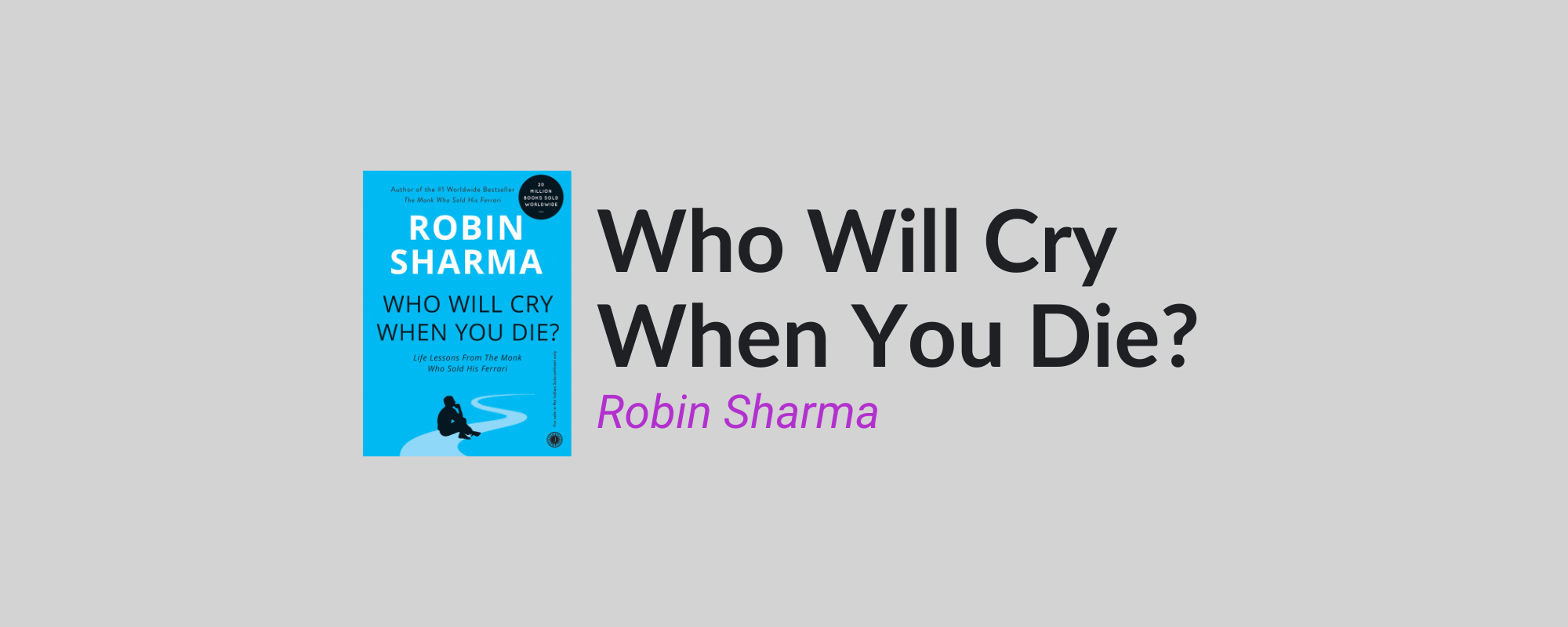Who Will Cry When You Die?

If there's one question that can make you pause for a moment—perhaps even jolt you into an introspective spiral—it's the one posed by Robin Sharma: Who Will Cry When You Die? Yes, that might sound morbid, but it's not really about doom and gloom. It’s a nudge, a small existential wake-up call, inviting us to think about what kind of mark we’re leaving on this world. I recently picked up Sharma’s book, and true to my usual style, I've crafted this review using a system I’ve honed over time. The approach is simple, direct, and organized into sections that make it easy to revisit when you need a refresher or are working on a project that could use a spark of wisdom. Whether you’re a professional, a student, or simply an enthusiast of personal growth, this structure helps distill the essence of what I absorbed from this book, making it accessible and useful for readers from all walks of life.
Why Did I Choose to Read This Book
The decision to read Who Will Cry When You Die? wasn’t an impulsive one—it was strategic, if you will. I often only read non-fiction and alternate between the following categories: leadership, growth, self-help, digital, tech, or marketing. Having previously enjoyed two of Sharma’s books, I was already familiar with his writing style—concise, relatable, and with the right balance of depth and accessibility. Add to that the evocative title, and it became an easy pick. This book promised insights on living purposefully, and I was keen to see how Sharma would approach such a profound theme.
Why Should You Read This Book
Who should read this book? Honestly—everyone. Whether you’re a professional seeking clarity and purpose beyond the boardroom, a student in search of direction, or a parent juggling life’s responsibilities, Sharma speaks to all. The beauty of this book lies in its profound simplicity—a roadmap to living purposefully that is easy to digest but carries depth. Sharma distills life lessons that resonate across different phases and paths, making it an ideal read whether you’re well-versed in personal development or just beginning your journey. It’s like an all-access pass to wisdom that’s actionable for anyone.
One True Value
If I had to condense the essence of Who Will Cry When You Die into a single core takeaway, it would be this: Life is about creating meaningful moments, and we are the authors of the story. It’s a call to action to make every chapter count—to take control of our narrative before it’s too late. Sharma’s chapter, "Rewrite Your Life Story," particularly spoke to me. It resonated with the idea that no matter where you are or what circumstances you face, it’s within your power to reframe, rewrite, and redirect your life. The moment I closed the book after reading that chapter, I opened my journal and started jotting down manifestations—commitments to myself about the kind of life I want to create. This book isn’t just about lofty ideals; it’s about taking small, practical actions that can make a profound difference. Sharma's approach—practical yet deep—encourages us to get moving rather than be paralyzed by perfectionism.
Three for Three
Three Takeaways for Students
- Make Today Count: Sharma emphasizes the importance of making each day purposeful. For students, this means seizing the day and investing in your growth—whether that’s learning a new skill or nurturing a meaningful relationship. Your future self will thank you.
- Rewrite Your Story Anytime: You are not stuck. This message is powerful for students who often feel bound by the expectations of others. You can start anew at any moment, and it's crucial to remember this.
- Daily Habits Build Long-Term Success: The emphasis on habits—small, simple ones—is key for students. From committing to a daily study routine to cultivating a habit of gratitude, Sharma shows how small actions can shape big outcomes.
Three Takeaways for Professionals
- Think Legacy, Not Just Success: Sharma challenges professionals to think beyond titles and career accolades. What impact are you making? This book is a gentle nudge to move from transactional living to transformational leadership—both at work and at home.
- The Power of Daily Practices: In our fast-paced professional lives, we often overlook the importance of small habits. Sharma’s approach—simple and practical—reminds us that morning rituals or acts of kindness can foster resilience and clarity.
- Rewrite Your Career Story: It’s never too late to pivot, shift, or rethink your career, a mission I am personally on right now. Sharma’s message about rewriting your life applies just as strongly to your professional journey—you have the power to redefine success on your terms.
Three Takeaways for Casual Readers
- Living Intentionally: Even if you’re reading this without a specific goal, Sharma’s reflections on intentional living are compelling. It’s a reminder to slow down and make the most of each moment, from the mundane to the magnificent.
- Practical, Realistic Wisdom: Unlike many self-help books, Sharma offers advice that’s actually doable—small tasks that don’t require financial extravagance or mastery-level skills. This makes it perfect for anyone looking to add a bit more purpose without overhauling their entire life.
- Joy in Everyday Acts: Find joy in small acts—a smile, a kind word, taking a quiet walk. The book urges us to rediscover the beauty in everyday moments, which is a message that will resonate with any reader.
The Aftermath
After reading Who Will Cry When You Die, I found myself inspired not just by the concepts but by the sheer practicality of the suggestions. It wasn’t necessarily filled with groundbreaking, new revelations, but it did serve as a refreshing reminder of the small, impactful choices we can make daily. In the end, Sharma’s work served as both a mirror and a guide—reflecting what’s already within us while nudging us gently towards growth.



Discussion